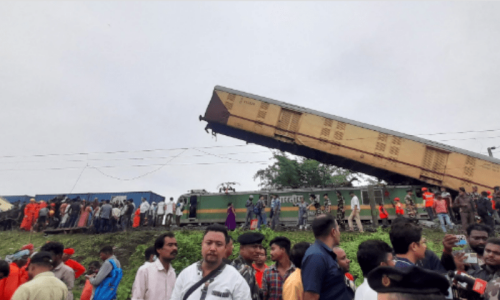PAKISTANIS have an imperfect knowledge of the four Rs — Reading, ‘Riting, ‘Rithmetic, and Russia. To master the first three requires education. To open one’s mind about Russia requires a different set of intellectual pliers.
Winston Churchill once defined Russia as “a riddle, wrapped in a mystery, inside an enigma”. Churchill was alive in 1913 when czarist Russia celebrated 300 years of Romanov rule, and in 1918 when the October Revolution overthrew the monarchy. He saw the rise of Lenin and the crimson permeation of Soviet communism. He negotiated with Joseph Stalin first as an ally and then as an adversary, admiring (he confessed) Stalin’s “deep, cool wisdom and a complete absence of illusions of any kind”.
From 1918 until the Soviet Union’s collapse in 1991, Russia hid behind an iron curtain, as xenophobic as Tibet once was. It was not always so secretive. Peter the Great visited England in 1697 to learn about shipbuilding. Nicholas II (as czarevich) in 1890-91 travelled eastwards to India, Sri Lanka and Japan. He visited Lahore in December 1890 and might have enjoyed it more, but for the un-seasonally hot weather and the ubiquitous British redcoats.
By 1947, Stalin had been ruling the Kremlin for over 20 years and Harry Truman presiding at the White House for two years. A fledgling Pakistan asserted cockily that “it was neither tied to the apron-strings of the Anglo-American bloc nor was it a camp follower of the communist bloc”.
Pakistan needs to be closer to Russia.
On June 3, 1949, Stalin sent an invitation to prime minister Liaquat Ali Khan to visit Moscow. According to a contemporary diplomat Sajjad Hyder (later himself Pakistan’s ambassador to the USSR, 1975-79), Liaquat “sincerely looked forward to his visit to the Soviet Union”, scheduled between August and November 1949. It turned out to be “the visit that never was”.
Liaquat chose to visit the United States instead. In May 1950, president Truman sent his personal plane to ferry the prime minister and his entourage from London to Washington D.C., where Truman and his entire cabinet gathered on the tarmac to receive their youngest ally.
Stalin never forgot that slight. Nor did his successors forgive Pakistan’s lap-dog relationship with its new master the United States.
In 1947, Pakistan joined the British Commonwealth — “that severed but still thrashing tail of Empire”. In 1954, Pakistan angered the Soviets by becoming part of SEATO, the US-sponsored bulwark against communism. In 1960, Pakistan caused Khrushchev apoplexy when the U-2 reconnaissance aircraft shot down over Russia was found to have taken off from outside Peshawar. Following the 1965 war with India, Pakistan’s Ayub Khan had to eat humble piroshkiat Tashkent, served by Soviet foreign minister Kosygin. In August 1971, smarting from Henry Kissinger’s secret visit to Beijing in July, Brezhnev invited Nixon to Moscow and simultaneously hosted Indian prime minister Indira Gandhi, whom he emboldened by signing the Indo-Soviet Treaty of Peace, Friendship and Cooperation.
This sharp-edged treaty troubled Pakistan, the US and China. It strengthened India’s hand in the war over Bangladesh in December 1971. The loss of East Pakistan was the price Pakistan paid once. A recurring cost has been Russia’s gift horse of the Pakistan Steel Mill — never profitable and still, 50 years later, a millstone around Pakistan’s over-burdened neck.
Russia’s recovery over the past 20 years under president Vladimir Putin — despite a tsunami of sanctions by the West — has been under-advertised. Russia wants to be accepted by Europe, Dr Kissinger has said, if only to transcend it. He warns that the West’s “demonisation of Vladimir Putin is not a policy; it is an alibi for the absence of one”.
Pakistan needs to be closer to Russia. In 2011, Russia took a conciliatory step by supporting Pakistan’s admission into the Shanghai Cooperation Organisation. Bilateral trade, military exchange, and direct investment though are anaemic compared to Russia’s robust relations with India. Cannily, Putin avoids queering China’s CPEC pitch in Pakistan.
Dr Henry Kissinger recalls that throughout history, “at critical junctures Russia has saved the world’s equilibrium from forces [Mongols, 16th century/ Sweden, 18th century/ Napoleon, 19th century/ Hitler, 20th century] that sought to overwhelm it”. Russia’s strength has been sapped over the years by wars, ideological detours and chronic mismanagement. If it is to consummate its “eternal quest for security and status”, Russia needs time and strong leadership.
“It is very fortunate for Russia in her agony to have … at her head … a man of massive outstanding personality, suited to the sombre and stormy times in which his life has been cast; a man of inexhaustible courage and will power.” These words were written by Churchill about Stalin. They also fit Putin’s brow.
The writer is an author.
Published in Dawn, September 17th, 2020











































